
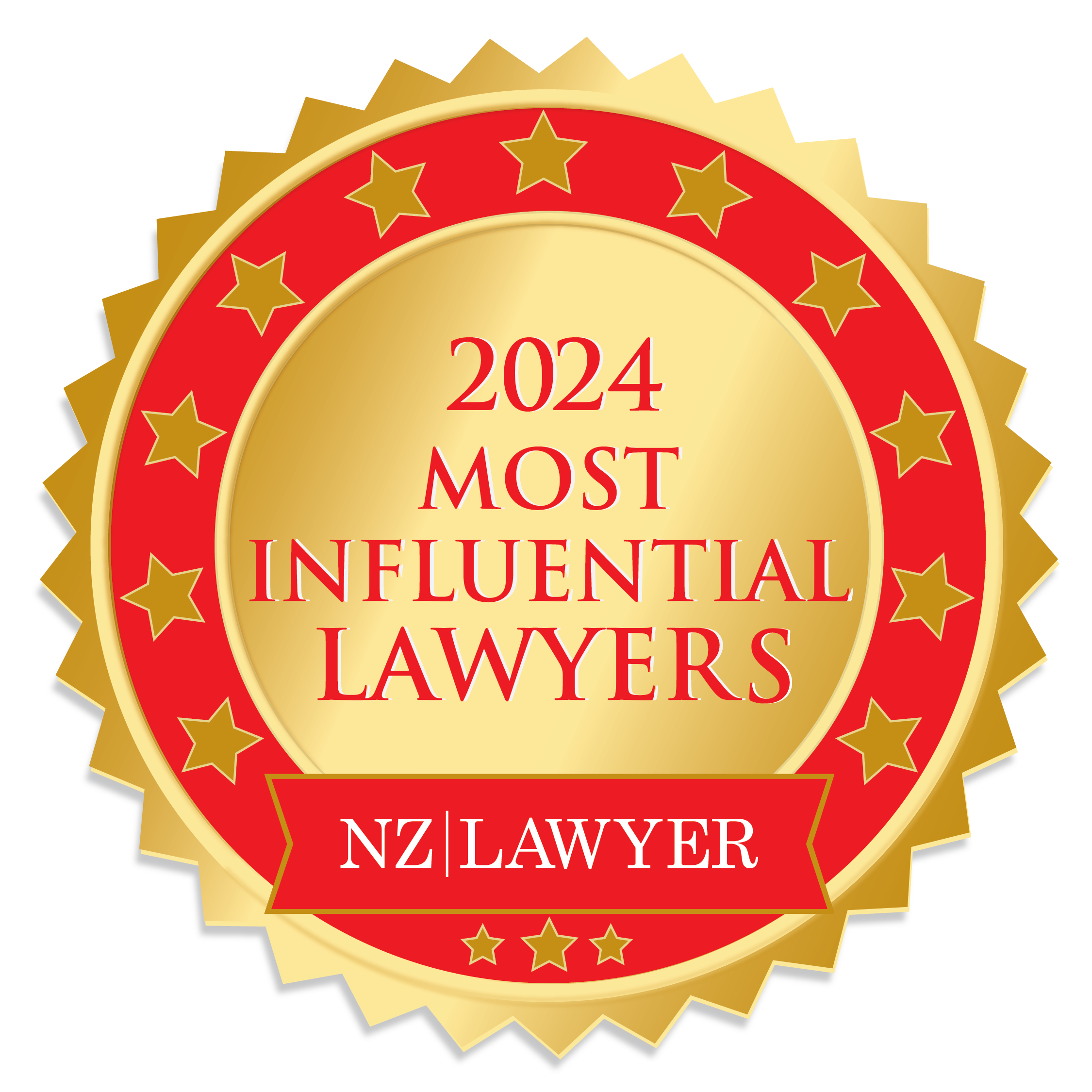
Jump to winners | Jump to methodology
The fourth annual edition of NZ Lawyer’s Most Influential Lawyers celebrates the winners’ standout contributions to their clients, the legal profession and respective practice areas, showcasing their proactive approaches and motivation to effect change.
From a pool of 33 impressive nominees carefully evaluated by the publication’s team, 24 honourees emerged for their exceptional expertise and vision to be crowned 2024 winners.
They have all positively influenced New Zealand’s unique legal landscape and clients’ lives across diverse categories, including changemakers, young influencers, human rights, advocacy and criminal.
Each influential lawyer has earned their place on NZL’s prestigious list, including four of the country’s brightest, highlighted in this report for their outstanding achievements and dedication.
Colleagues of the intellectual property firm partner describe her gracious approach and compassionate leadership as “a true asset.”
Recognised as an accomplished dual-qualified trademark and intellectual property specialist who prioritises meaningful relationships with Pasifika and Māori entrepreneurs, Brugh builds trust and empowers clients to navigate the legal framework while preserving their cultural identity and values.
“I am blessed that I can navigate both worlds and bridge that gap,” she says, expressing gratitude for her upbringing in Rarotonga, Cook Islands. “It’s about empowerment and my clients’ need for knowledge in navigating the predominantly Western framework, which isn’t necessarily aligned or complementary to a Pasifika and Māori worldview of a more collective approach.”

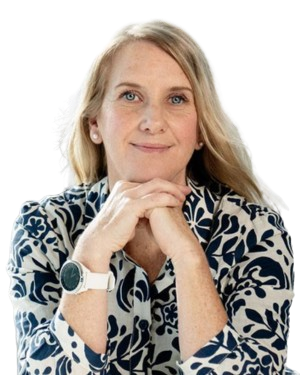
Her unique approach and viewpoint contributed significantly to the following achievements:
influencing copyright/IP policy: instrumental in guiding New Zealand’s policymakers on new copyright law with a Pacifika lens that honours the kaupapa and rights of the artists
improving pastoral care for Pasifika workers: as co-chair of the Pacific Island Community Tauranga Trust, supported the design of new pastoral care RSE initiatives, setting a new standard of care for Pasifika workers and ensuring they are nurtured and holistically cared for when working in New Zealand
Several strategies have played a crucial role in shaping Brugh’s legal practice and influential reputation, including:
walking alongside clients and ensuring their voices are heard
connecting with clients by sharing kai, engaging in conversation and enjoying time together
prioritising meaningful connections as paramount over the typical financially driven approach, supported by her firm’s leadership
“I’ve had different cultural experiences and influences in my life and worked with incredibly diverse people that have shaped my perspective, creating a unique way of doing my work,” Brugh says. “That’s why I give so much back; I wouldn’t be who I am today but for the people who have shaped me on my way, the clients who enriched me and allowed me to navigate and do my job.”
Concerns about how the country’s legal system and adversarial approach impacted families and clients led this influential lawyer to advance collaborative legal practices through pioneering initiatives within the profession.
“I kept feeling that there had to be a better, more holistic way to nurture the future relationships that parties still had to have,” Trigg says. “Once the lawyers are gone, these parties still have to be able to work together.”
Trigg took a bold step in 2021 in what she calls a “nerve-wracking” decision to wind up her busy family court litigation practice, focusing instead on the collaborative negotiation and mediation side to help parties resolve issues outside of court. Business has been brisk, with potential clients proactively seeking out an alternative to heading to court.
“Collaborative practice teaches amazing skills for building rapport with clients, diving deep into their true interests and understanding what is important for them and their family, which helps build strong client relationships,” she says.

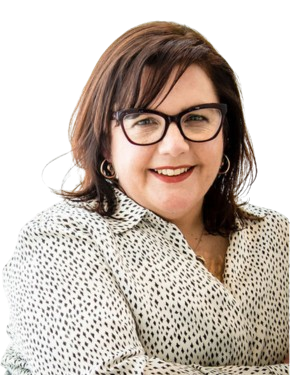
Her tireless efforts in reshaping the legal landscape to be more just and equitable include:
pioneering collaborative law: instrumental in developing collaborative law as a dispute resolution process in New Zealand; chairing Collaborative Resolution New Zealand (CRNZ) from 2012 to 2020
volunteer leadership: serving on the board of the International Academy of Collaborative Professionals (IACP) since 2020 and becoming its president on 1 July 2024; being a member of the working group that drafted the Law Society’s submissions for the Law Commission’s review of legislative change in the area of surrogacy and to the Select Committee regarding the Bill that followed
innovative initiatives: spearheaded accessible online collaborative law training for family lawyers since 2020
Trigg attended an IACP conference in the United States and brought home the valuable skills of client intake, which seamlessly brings the parties into the process. Her work with the organisation regionally and overseas helps legal professionals find transformative ways to work with families going through conflict in a manner that is respectful, dignified and focused on the family’s needs while being legally robust.
“I found a community that was so warm and welcoming and generous with their experience, knowledge and expertise,” she says. “That ongoing relationship with collaborative professionals has been integral to my development.”
As one of the youngest directors at the whānau-focused firm, Hockley has risen to prominence for her keen insight into maintaining positive, long-term relationships for success within New Zealand’s relatively small business community.
“Our firm approaches everything, including legal issues, through the lens of our values, which often results in better outcomes for our clients,” she says.
While leading the firm’s asset planning team, Hockley is instrumental in shaping its strategic direction, including promoting staff wellbeing, professional development and work-life harmony.
She has significantly invested in developing her governance skills to make a positive difference within the legal profession and the wider community, particularly for vulnerable people.

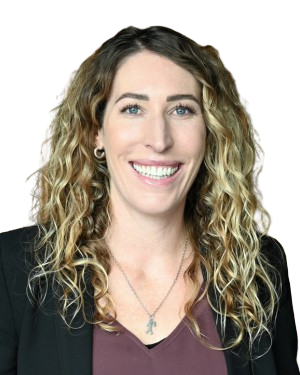
Using her governance skills to give back to the community is among her most notable accomplishments, which include:
community contributor: assisting the charitable trust, ConneXu, to expand into additional regions, significantly increasing the number of individuals it supports with physical, cognitive and sensory disabilities to over 200 people, with over 250 staff; the organisation now turns over more than $20 million per annum
legal reform advocacy: lobbying local government as an Age Concern Waikato trustee, advocating for its home, the Celebrating Age Centre in Hamilton Central, to be reopened and refurbished
“There’s been such a period of growth since I’ve been involved with ConneXu, and it’s been exciting to be able to help so many people from so many different communities,” she says.
McCaw Lewis’s chief executive, Glenn Forster, says, “Amanda constantly leads from the front in all she does. She mentors and leads several young lawyers and has been instrumental in leading the focus on work-life harmony, which has been a significant contributor to our great culture at the firm.”
The criminal defence and traffic law specialist places great importance on creating relationships based on mutual trust and respect with clients from myriad cultural backgrounds.
Singh takes pride in developing a deep appreciation for her clients’ cultural challenges and differences, a unique skill set she has cultivated that enables her to achieve successful outcomes.
“I welcomed the transformative Te Ao Mārama initiative (in 2020) as I have witnessed that sincerely remorseful clients who express a genuine willingness to undergo rehabilitation have achieved positive sentencing outcomes,” she says. “In most cases, my clients have attended their sentencing hearing having completed their rehabilitation, which has enabled me to achieve excellent results for my clients over the past 20 years.”
Despite the government’s cessation of funding cultural reports used in sentencing in February 2024, Singh’s experience as a cultural report writer ensures her clients are not disadvantaged, as she continues to incorporate their cultural factors into sentencing submissions.

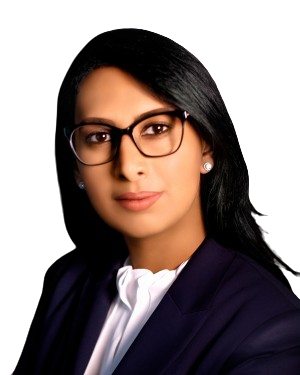
Colleagues attest to her exceptional knowledge, determination, and communication skills, which are at the forefront of the following community involvements that have had a profound impact:
cultural leadership: advocating for the importance of cultural capability for lawyers through her work on the Auckland Women Lawyers’ Association (AWLA) committee in 2022 and 2023
diversity initiatives: created AWLA’s first-ever cultural diversity fundraising event, supporting its scholarship fund for young women’s legal education
international recognition: honoured at the House of Lords with the Bharat Gaurav Award (Pride of India) for excellence in public service, particularly for her efforts to drive cultural awareness and mentor young lawyers in the Asian community
“I am passionate about advancing women in law and society, and I have received widespread recognition for the pro bono work I carried out, including the For Fiji project, that assisted young female law students in Fiji,” says Singh.
Building and nurturing relationships is at the heart of Singh’s success. She elevates this by initiating and organising countless social and educational programs, including mentoring 24 young lawyers and counting.
Nominator Mai Chen, a Public Law Toolbox Chambers barrister and fellow 2024 influential lawyer, says, “Anjeet is a natural-born leader who, through sheer hard work, understands how to get things done. Her unique viewpoint as a migrant woman of colour is invaluable, particularly in bringing a different lens to the issues that truly matter to the legal profession.”
Tonia Brugh’s challenge: Embarking on a mission to improve the lives of Pasifika seasonal workers is an ongoing effort to which Brugh is passionately committed in her role on the trust board. The key challenges were ensuring these workers were treated respectfully, paid fairly and provided culturally appropriate accommodations and pastoral care.
Action: Implementing a wrap-a-round framework that is Pasifika-led for Pasifika people, giving a voice to the people at the challenge’s core. The multifaceted solution includes aspects such as a cultural mentor who greets workers at the airport and assists in housing the workers in communities surrounded by their churches and culture, ensuring they are cared for as they transition into New Zealand’s temporary work environment.
Lessons learned: Brugh learned the value of truly listening to the perspectives of those involved on the ground and empowering their voices in developing solutions. Instead of an outside-in approach, she focused on understanding the real needs of those directly impacted and wrapping supportive structures around that insight. “This approach honours and understands the workers’ needs by wrapping them in pastoral care so they have a beautiful and enriched experience here, rather than feeling left to navigate on their own,” says Brugh.
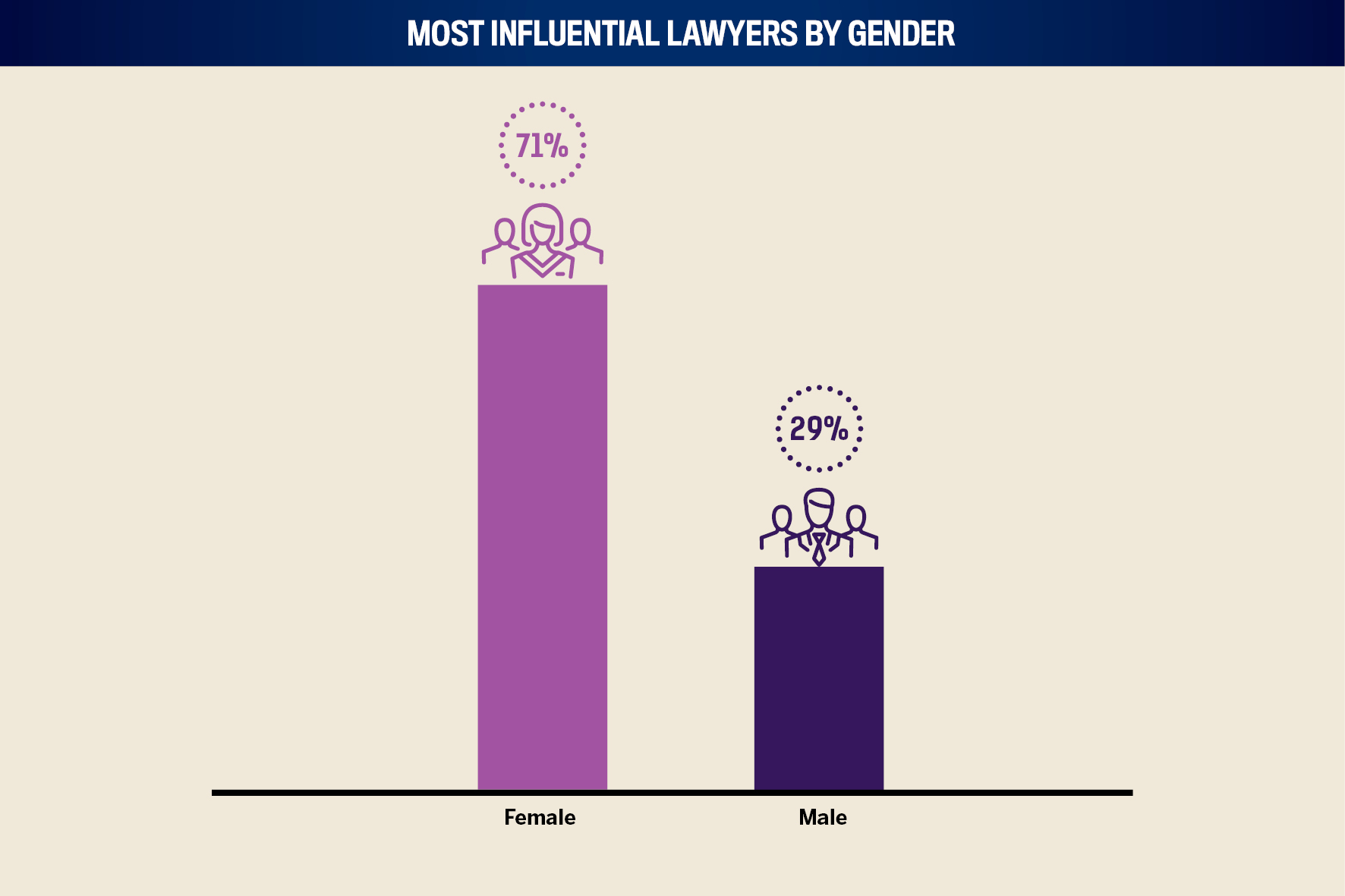
Selina Jane Trigg’s challenge: There is a perception that the collaboration process is a “soft option” for those who can readily reach an agreement. It isn’t a soft option for anyone involved; the cases are often complex in multiple ways, and the parties and professional team must actively participate in negotiation meetings while attending to the parties’ emotional state and conflict style.
Action: The professional teams fill a “tall order” in navigating constructive solutions without slipping back into positional, adversarial ways while being mindful of the parties’ emotional and psychological needs so they can participate effectively, mitigating conflict.
Lessons learned: Trigg learned to curb her desire to push through to a conclusion. She says, “While persistence is key to reaching resolutions, pauses are often progress if they allow the parties to return to negotiations and participate constructively.”
Amanda Bedford’s challenge: Difficult family dynamics and familial relationships are often the most challenging files, rather than complex legal matters.
Action: Consistent and transparent communication helps Hockley navigate clients’ emotions.
Lessons learned: “Time and again, I’ve learned that it’s often just managing people that is key, including clients, staff and other lawyers. Getting the tone right and approaching things genuinely are also beneficial,” she says.
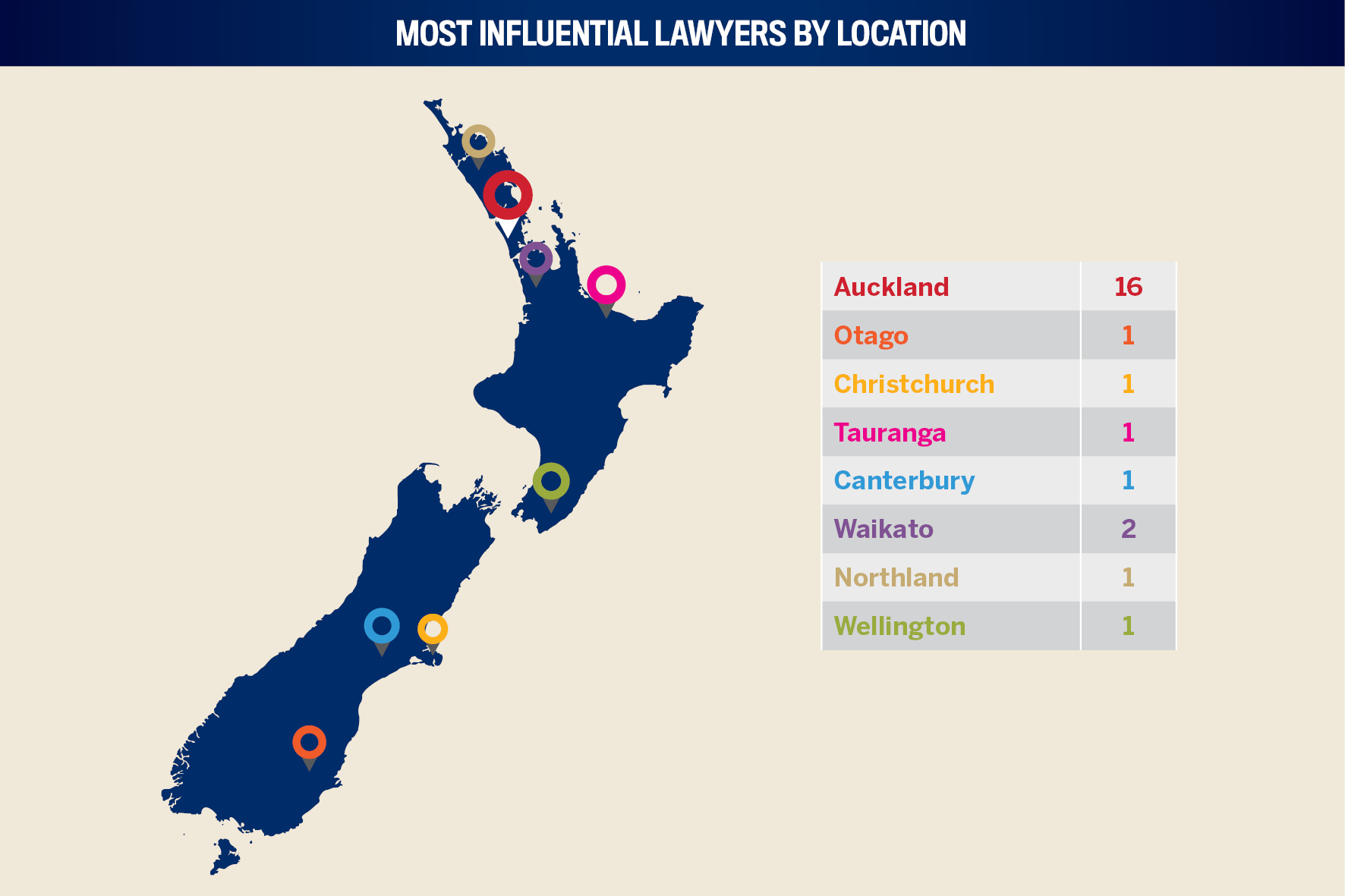
Anjeet Singh’s challenge: Every criminal case has its challenges, as Singh’s clients come to her at a stressful time in their lives.
Action: Preparation is paramount for Singh, complemented by a non-judgemental, empathic approach that keeps clients’ best interests at the forefront. She cites her ability to apply a combination of emotional quotient and intelligence quotient to achieve optimum client outcomes.
Lessons learned: “We have to look at the bigger picture, not just on a case-by-case basis. Sometimes, going through the court system, as hard as it is, can be a catalyst for change. My open mindset and willingness to put myself in my clients’ shoes allow me to get the best results for them,” Singh says.
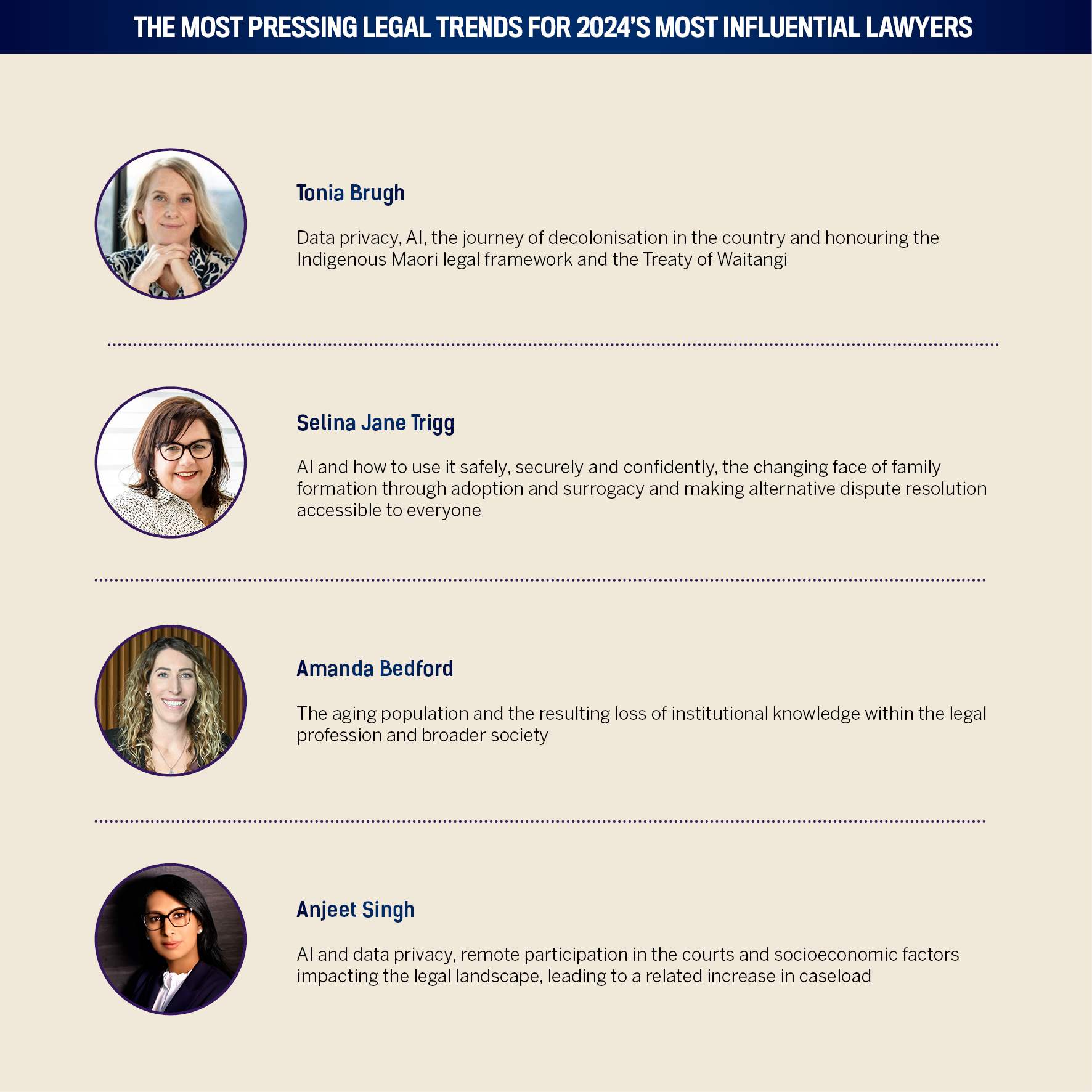
Scroll down to see the Most Influential Lawyers and click on their profiles to learn more about them.
NZ Lawyer opened the window to nominations for its fourth annual Most Influential Lawyers list on 18 March 2024. The research team sought prospective candidates in the following categories:
Business
Changemakers – lawyers who have been leaders, innovators or catalysts for positive change in any area of their profession
Government/non-profits/associations
Human rights, advocacy and criminal law
Young influencers – young lawyers aged 40 or under who have had an extraordinary impact on the profession or society
Nominees were asked to detail their achievements, provide examples of their accomplishments and share their contributions to the legal profession on the nomination form.
The NZ Lawyer team then evaluated the nominations, reviewing them based on the overall impact of their contributions. The 24 lawyers who made the final list were those who delivered specific outcomes in support of their peers and the industry.